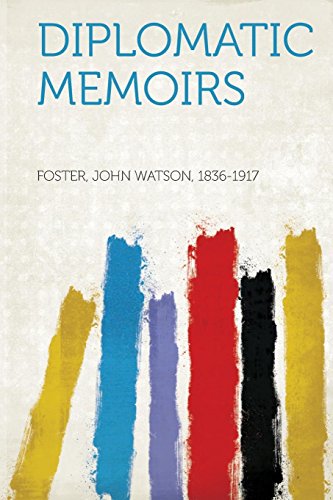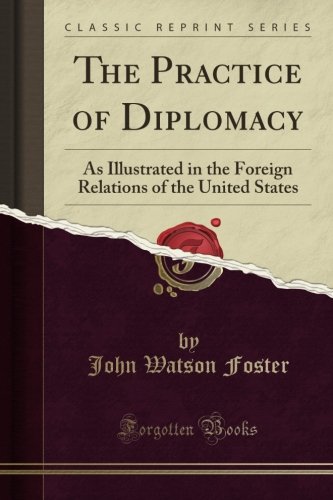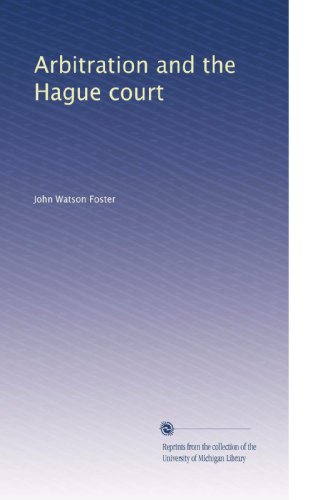Background
John Watson Foster was born on March 2, 1836 in Pike County, Indiana, where his father, Matthew Watson Foster, was a successful farmer. His mother, Eleanor Johnson, came of a Virginia family.



(Unlike some other reproductions of classic texts (1) We h...)
Unlike some other reproductions of classic texts (1) We have not used OCR(Optical Character Recognition), as this leads to bad quality books with introduced typos. (2) In books where there are images such as portraits, maps, sketches etc We have endeavoured to keep the quality of these images, so they represent accurately the original artefact. Although occasionally there may be certain imperfections with these old texts, we feel they deserve to be made available for future generations to enjoy.
https://www.amazon.com/Diplomatic-Memoirs-Foster-Watson-1836-1917/dp/1314628607?SubscriptionId=AKIAJRRWTH346WSPOAFQ&tag=prabook-20&linkCode=sp1&camp=2025&creative=165953&creativeASIN=1314628607

(Excerpt from The Practice of Diplomacy: As Illustrated in...)
Excerpt from The Practice of Diplomacy: As Illustrated in the Foreign Relations of the United States It has not been the purpose to make this work a manual of diplomatic procedure, that field being already occupied by European publications. It is rather designed as a companion volume and complement of "A Century of American Diplomacy." As the latter sought to show the influence exerted by the United States in the framing and improvement of international law, the present work is intended, primarily, to set forth the part taken by American diplomatists in the elevation and purification of diplomacy; and, secondarily, to give in popular form, through such a narrative, the rules and procedure of diplomatic intercourse. While it is prepared for the general reader, numerous citations of authorities are given to enable the student to pursue his investigation by an examination of the original sources of information. About the Publisher Forgotten Books publishes hundreds of thousands of rare and classic books. Find more at www.forgottenbooks.com This book is a reproduction of an important historical work. Forgotten Books uses state-of-the-art technology to digitally reconstruct the work, preserving the original format whilst repairing imperfections present in the aged copy. In rare cases, an imperfection in the original, such as a blemish or missing page, may be replicated in our edition. We do, however, repair the vast majority of imperfections successfully; any imperfections that remain are intentionally left to preserve the state of such historical works.
https://www.amazon.com/Practice-Diplomacy-Illustrated-Foreign-Relations/dp/133049041X?SubscriptionId=AKIAJRRWTH346WSPOAFQ&tag=prabook-20&linkCode=sp1&camp=2025&creative=165953&creativeASIN=133049041X

(Excerpt from War Stories for My Grandchildren When the P...)
Excerpt from War Stories for My Grandchildren When the President's second call for volunteers was issued, a movement was at once set on foot to organize a regiment at Evansville, my home, and the Governor of the State had intimated his intention to appoint me major of this new regiment. On August 9 my appointment as major was made. The next day I sent my wife's brother, Alexander, to Glendale, near Cincinnati, where she was visiting her mother, to notify her of the event and give her details of the situation. He bore her a letter in which I wrote: Zan alexander will explain the cause of his coming. I want to be with my wife as much as I can before I go, so you must hurry home as fast as you can. While you are a loving wife, remember to be a brave woman and your husband will love you the more. About the Publisher Forgotten Books publishes hundreds of thousands of rare and classic books. Find more at www.forgottenbooks.com This book is a reproduction of an important historical work. Forgotten Books uses state-of-the-art technology to digitally reconstruct the work, preserving the original format whilst repairing imperfections present in the aged copy. In rare cases, an imperfection in the original, such as a blemish or missing page, may be replicated in our edition. We do, however, repair the vast majority of imperfections successfully; any imperfections that remain are intentionally left to preserve the state of such historical works.
https://www.amazon.com/War-Stories-Grandchildren-Classic-Reprint/dp/133034376X?SubscriptionId=AKIAJRRWTH346WSPOAFQ&tag=prabook-20&linkCode=sp1&camp=2025&creative=165953&creativeASIN=133034376X

(High Quality FACSIMILE REPRODUCTION: :Foster, John Watson...)
High Quality FACSIMILE REPRODUCTION: :Foster, John Watson, 1836-1917 :Arbitration And The Hague Court FACSIMILE :Facsimilie: Originally published by Boston, New York : Houghton, Mifflin and Company in 1904. Book will be printed in black and white, with grayscale images. Book will be 6 inches wide by 9 inches tall and soft cover bound. Any foldouts will be scaled to page size. If the book is larger than 1000 pages, it will be printed and bound in two parts. Due to the age of the original titles, we cannot be held responsible for missing pages, faded, or cut off text.
https://www.amazon.com/Arbitration-Hague-court-Watson-Foster/dp/B00303GCQK?SubscriptionId=AKIAJRRWTH346WSPOAFQ&tag=prabook-20&linkCode=sp1&camp=2025&creative=165953&creativeASIN=B00303GCQK
Diplomat editor lawyer military
John Watson Foster was born on March 2, 1836 in Pike County, Indiana, where his father, Matthew Watson Foster, was a successful farmer. His mother, Eleanor Johnson, came of a Virginia family.
Foster attended the University of Indiana (B. A. ), where through study and in debate he developed the anti-slavery convictions implanted by his father. After a year at the Harvard Law School he spent another year in a law office in Cincinnati before he associated himself in the practice of law at Evansville with Conrad Baker, one of the ablest lawyers of Indiana.
When the Civil War broke out Foster’s zeal for the anti-slavery cause and for the Union led him to enlist. Governor Morton sent him a commission as major. For his share in the capture of Fort Donelson he was promoted lieutenant-colonel, and for his meritorious service at Shiloh he was made a colonel.
He commanded a brigade of cavalry in Burnside’s expedition into East Tennessee and was the first to occupy Knoxville in 1863. He learned to know Grant, Sherman, and Thomas. Foster states in his Memoirs that his military life enlarged his knowledge of men and gave him a fuller self-confidence.
After the war Foster became editor of the Evansville Daily Journal, the most influential paper in Southern Indiana. In 1872, he served as chairman of the Republican state committee. As such he was instrumental in bringing about the reelection of Oliver P. Morton to the United States Senate and of Gen. Grant to the presidency.
In 1873 President Grant designated him as minister to Mexico. He served there during the transition from the Lerdo to the Diaz régime and under trying circumstances succeeded in making himself highly agreeable to the Mexican government.
Early in 1880, President Hayes transferred him to St. Petersburg. He remained there a year and had little to do except to attend ceremonies and to plead for leniency in the treatment of American Jews.
He returned to Washington and set up in the practise of law. In 1883, President Arthur offered him the appointment as minister to Spain. Foster accepted. He negotiated a reciprocity treaty affecting the trade with Cuba, but the treaty failed to meet the approval of the Senate.
During Cleveland’s first administration Foster practised law. Harrison appointed him on a special mission to Madrid to negotiate another reciprocity treaty. This treaty became effective and for two years greatly facilitated American trade with Cuba and Porto Rico.
During the latter part of Harrison’s administration Foster became the agent for the United States in the Bering Sea or fur-seal arbitration. Two unexpected events weakened the case of the United States.
As a part of the transfer of Alaska, Russia had delivered to the Department of State a mass of archives in the Russian language. These were reputed to show—and Foster so believed—that Russia had exercised exclusive territorial jurisdiction over Bering Sea.
Foster employed one Ivan Petroff to select the pertinent documents and to translate them. Petroff furnished the translations to support the American contention. Copies of the documents and their translation occupied a prominent place in the case. Several weeks after their submission to counsel for Great Britain a clerk in the Department of State, William C. Mayo, discovered discrepancies. Petroff confronted with the evidence admitted his guilt. Foster promptly informed the British legation in Washington of the circumstances of the case and explained to the British agent how the perfidy had been imposed upon him. The second untoward event occurred during the oral arguments before the tribunal at Paris. Russia had supported the stand taken by the United States for the protection of the fur-seals.
On June 21, 1893, Sir Richard Webster asked permission to read a document which had been laid before Parliament. Russia had conceded to Great Britain that seals could be taken anywhere outside a zone of thirty miles around the Russian islands on the Asiatic side of Bering Sea.
The United States lost the case on all points with the exception that the tribunal allowed a prohibited zone of sixty miles around the Pribilof Islands. For about eight months during 1892 and 1893 and partly overlapping the period of the fur-seal arbitration Foster served as secretary of state. As such he negotiated a treaty of annexation with the Republic of Hawaii.
This negotiation took place so shortly after the establishment of the republic under the domination of American citizens there and under such questionable circumstances that when Cleveland succeeded to the presidency he withdrew the treaty from the Senate. Another important event in his term was the Baltimore incident. Captan W. S. Schley of the Baltimore in Santiago harbor, Chile, had given shore leave to a number of sailors and officers.
Whatever the cause may have been, a fight ensued in which two sailors were killed and seventeen wounded. Foster called attention to the fact that reparation was due the injured and the dependents of those who had been killed. Chile proposed arbitration. Foster replied that inasmuch as questions of national honor were involved a frank and friendly offer of voluntary compensation would be accepted as a proof of good-will.
Thereupon Chile offered $75, ooo in gold which was accepted as satisfactory. At the close of the Chino-Japanese War, December 1894, the Chinese foreign office invited Foster, then a private citizen, to join the Chinese commissioners in the negotiation of peace with Japan.
He accepted, and performed a creditable service in bringing about an agreement between Li Hung Chang and Marquis Ito. Later, in 1907, Foster represented China at the Second Hague Conference. In 1903 Great Britain and the United States agreed to arbitrate their differences about the Alaska-Canadian boundary.
The United States designated Foster as agent to take charge of the preparation of the case. Greatly to his credit the tribunal sustained substantially his arguments and conclusions. As a lawyer in Washington Foster represented various governments, notably the Mexican. Probably the most important case concerned the Weil and La Abra claims of over a million dollars, which had been awarded to the United States by a claims commission. Foster found and proved that the awards had been obtained through fraud. Through his efforts Mexico was reimbursed for payments made on these claims.
Foster delivered numerous lectures on various phases of international relations which found their way later into periodicals and pamphlets. He was especially interested in foreign missions and in arbitration. His courses at George Washington University comprised the salient features of American diplomatic history from 1776 to 1876, the rules and procedure of diplomatic intercourse, which developed into the best book of its kind written by an American, and an outline of the relations of the United States with the Orient. Included in his printed works, which are marked by a good perspective, a restrained and apt use of anecdote, optimism, and a clear and readable style, are the following: A Century of American Diplomacy, 1776-1876 (1900); American Diplomacy in the Orient (1903); Arbitration and the Hague Court (1904); The Practise of Diplomacy (1906); and War Stories for my Grandchildren (1918).
Foster died in Washington, D. C. on November 15, 1917. His body was returned to Evansville, Indiana, where it remains in Oak Hill Cemetery.
John Foster was a prominent politician and diplomat who had a great influence on American diplomacy of his time. Foster served as Minister to Mexico between 1873 and 1880. He then served as Minister to Russia from 1880 to 1881. Foster assumed duties as Minister to Spain in 1883 and served until 1885, and then he served as counsel representing foreign diplomatic legations in the United States. In 1892, President Harrison appointed Foster as Secretary of State. His major achievement while serving as Secretary of State was in encouraging of the American interests in Hawaii, which resulted in negotiation of a treaty (1893) for the annexation of Hawaii. While serving in Mexico, Foster also began the negotiations to resolve United States-Mexico border troubles that eventually led to an 1882 agreement.
(Excerpt from War Stories for My Grandchildren When the P...)
(Excerpt from The Practice of Diplomacy: As Illustrated in...)
(High Quality FACSIMILE REPRODUCTION: :Foster, John Watson...)
(Unlike some other reproductions of classic texts (1) We h...)
In his political affiliation John Foster was a Republican, and after his service in the Union army during the Civil War, working then as a lawyer and newspaper editor in Evansville, Indiana, he was active in state Republican affairs.
In 1859 John Watson Foster married Mary Parke McFcrson who received repeatedly in his writings tributes for her counsel, assistance, and affection. He was the Grandfather of Eisenhower Administration Secretary of State John Foster Dulles, who served during the height of the Cold War.
1834–1905
1841–1864
1878–1888
1863–1941
1866–1934
1860–1868
1840–1922
1811–1849
1880–1881
1844–1906
1838–1895
1830–1897
1800–1863
Eisenhower Administration Secretary of State 1888 – 1959
American statesman and Republican politician who represented Maine in the U.S. House of Representatives from 1863 to 1876.
